中考英语情态动词用法总结
初中英语中考重要情态动词用法汇总(共10个)
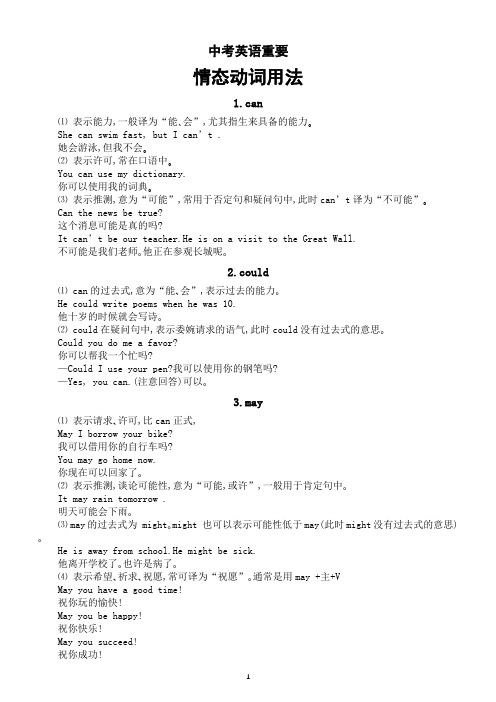
中考英语重要情态动词用法1.can⑴ 表示能力,一般译为“能、会”,尤其指生来具备的能力。She can swim fast, but I can’t .她会游泳,但我不会。⑵ 表示许可,常在口语中。You can use my dictionary.你可以使用我的词典。⑶ 表示推测,意为“可能”,常用于否定句和疑问句中,此时can’t译为“不可能”。Can the news be true?这个消息可能是真的吗?It can’t be our teacher.He is on a visit to the Great Wall.不可能是我们老师。他正在参观长城呢。2.could⑴ can的过去式,意为“能、会”,表示过去的能力。He could write poems when he was 10.他十岁的时候就会写诗。⑵ could在疑问句中,表示委婉请求的语气,此时could没有过去式的意思。Could you do me a favor?你可以帮我一个忙吗?—Could I use your pen?我可以使用你的钢笔吗?—Yes, you can.(注意回答)可以。3.may⑴ 表示请求、许可,比can正式,May I borrow your bike?我可以借用你的自行车吗?You may go home now.你现在可以回家了。⑵ 表示推测,谈论可能性,意为“可能,或许”,一般用于肯定句中。It may rain tomorrow .明天可能会下雨。⑶ may的过去式为 might。might 也可以表示可能性低于may(此时might没有过去式的意思)。He is away from school.He might be sick.他离开学校了。也许是病了。⑷ 表示希望、祈求、祝愿,常可译为“祝愿”。通常是用may +主+VMay you have a good time!祝你玩的愉快!May you be happy!祝你快乐!May you succeed!祝你成功!4.must⑴ must 表示主观看法,意为“必须”。You must stay here until I come back.你必须待在这里,直到我回来。Must I hand in my homework right now?我现在必须要交作业吗?⑵ 对must引导的疑问句,肯定回答为must,否定回答为needn’t或don’t have to .—Must I finish my homework?我必须完成作业吗?—No, you needn’t.不,你不必。⑶ must也可以表示有把握的推测,意为“ 一定,肯定”,用于肯定句。The light is on, so he must be at home now.灯开着,所以他现在一定在家。⑷ 其否定形式mustn’t表示“禁止,不许”。You mustn’t play with fire.你不许玩火。You mustn’t be late.你不许迟到。注意:其反意问句的构成形式:当must表示肯定的判断、推测时,其反意疑问句要用实际问句的助动词来构成。She must have seen the film before,hasn’t she?(注意反意疑问句的后半部分)她之前一定看过这部电影,难道没有吗?You must have met uncle Wang in the shop yesterday,didn’t you?(注意反意疑问句的后半部分)你昨天一定在商店见到王叔叔了,难道没有吗?5.need⑴ need表示需要,主要用于否定句和疑问句中,其否定形式为needn’t,意为“不必”。用need提问时,肯定回答为must,否定回答为needn’t或don’t have to。—Need I stay here any longer?我需要待在这里吗?—Yes, you must .是的,你必须。—No.you needn’t /don’t have to.不,你不必。(2) need还可以作实义动词,此时有人称、数和时态的变化,如果是人作主语后边多接动词不定式。I need to do it right now.我需要现在做这件事。注意:如果是物作主语,一般用need doing与need to be done,这种情况下应注意两点:① 主动形式的动名词doing具有被动的含义;② 该动名词可以改为其动词不定式的被动形式而句子的意义不变。The door needs painting.= The door needs to be painted.门需要被油漆。6.daredare意为“敢、敢于”,用法近似于need,有两种词性:⑴ dare作为情态动词,多用于否定句、疑问句或条件句中,无第三人称单数形式,只有一般现在时和一般过去时。Dare he tell them what he knows?他敢告诉他们他知道的事情吗?I daren’t ask her.Will you do it for me?我不敢问她。你可以为我问吗?⑵ dare作为实义动词,此时有人称、数及时态的变化。He doesn’t dare to break his promise.他不敢违背承诺。注意:口语中,dare的各种形式常与不带to的不定式连用。Do you dare tell her what I said?你敢告诉她我说的话吗?7.shallshall表示征求对方意见(多用于第一、三人称)Shall we go out for a walk?我们出去散步好吗?Shall the driver wait outside?司机在外面等好吗?8.should⑴ should 意为“应该”,可表示劝告、建议、义务、责任等。We should protect the environment.我们应该保护环境。⑵ Should have done 意为”本应该做某事而没做“,表示对过去动作的责备、批评。You should have finished your homework.你本应该完成作业的。(实际上没有)9.willwill表示意愿、意志、打算,可用于多种人称。I will help you if I’m free this afternoon.如果下午有空,我会帮你的。10.had betterhad better意为“最好”,没有人称的变化,后面接不带to的不定式,其否定形式为:had better not。We had better go now.你最好现在去。。
中考英语情态动词用法总结

中考英语情态动词用法总结情态动词是英语中一种特殊的动词形式,用来表示说话人的情态和态度,以及表示可能性、能力、推测、请求、命令等。
以下是中考英语常见的情态动词及其用法总结:1. can/could-表示能力或允许做事- 例如:I can swim.(我会游泳。
)- 例如:Could I borrow your pen?(我可以借用你的钢笔吗?)2. may/might-表示可能性、许可或请求允许- 例如:It may rain tomorrow.(明天可能会下雨。
)- 例如:May I use the restroom?(我可以去洗手间吗?)3. must-表示必须或肯定性- 例如:You must finish your homework before going out.(你必须先做完作业才能出去。
)- 例如:He must be tired.(他一定很累。
)4. should-表示建议、义务或期望- 例如:You should eat more fruits and vegetables.(你应该多吃水果和蔬菜。
)- 例如:You should apologize for what you said.(你应该为你说的话道歉。
)5. would-表示愿意、习惯或请求礼貌- 例如:Would you like some tea?(你想要些茶吗?)- 例如:He would always help others.(他总是愿意帮助别人。
)6. will/would-表示将来时态或意愿- 例如:I will visit my grandparents next weekend.(下个周末我将去看望我的爷爷奶奶。
)- 例如:Would you like to join us for dinner?(你愿意和我们一起吃晚饭吗?)需要注意的是,情态动词本身不变化,没有人称和数的变化。
它们后面接原形动词,表示动作或状态。
【中考英语总复习 精讲精练】8 情态动词(原卷版)
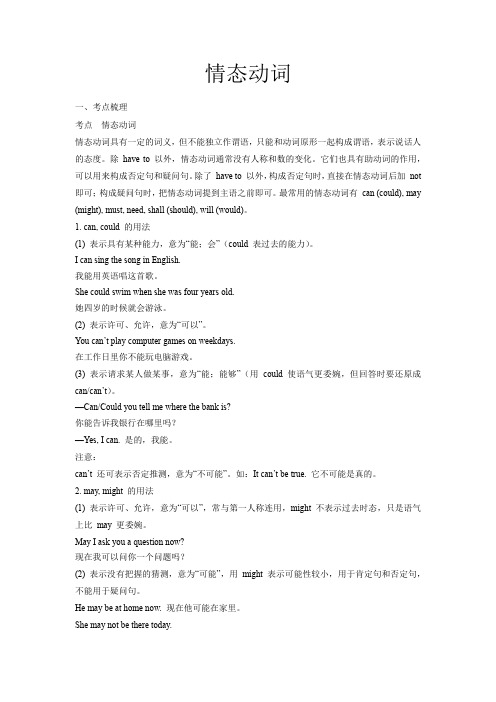
情态动词一、考点梳理考点情态动词情态动词具有一定的词义,但不能独立作谓语,只能和动词原形一起构成谓语,表示说话人的态度。
除have to 以外,情态动词通常没有人称和数的变化。
它们也具有助动词的作用,可以用来构成否定句和疑问句。
除了have to 以外,构成否定句时,直接在情态动词后加not 即可;构成疑问句时,把情态动词提到主语之前即可。
最常用的情态动词有can (could), may (might), must, need, shall (should), will (would)。
1. can, could 的用法(1) 表示具有某种能力,意为“能;会”(could 表过去的能力)。
I can sing the song in English.我能用英语唱这首歌。
She could swim when she was four years old.她四岁的时候就会游泳。
(2) 表示许可、允许,意为“可以”。
You can’t play computer games on weekdays.在工作日里你不能玩电脑游戏。
(3) 表示请求某人做某事,意为“能;能够”(用could 使语气更委婉,但回答时要还原成can/can’t)。
—Can/Could you tell me where the bank is?你能告诉我银行在哪里吗?—Yes, I can. 是的,我能。
注意:can’t 还可表示否定推测,意为“不可能”。
如:It can’t be true. 它不可能是真的。
2. may, might 的用法(1) 表示许可、允许,意为“可以”,常与第一人称连用,might不表示过去时态,只是语气上比may 更委婉。
May I ask you a question now?现在我可以问你一个问题吗?(2) 表示没有把握的猜测,意为“可能”,用might 表示可能性较小,用于肯定句和否定句,不能用于疑问句。
中考英语情态动词考点总结与归纳
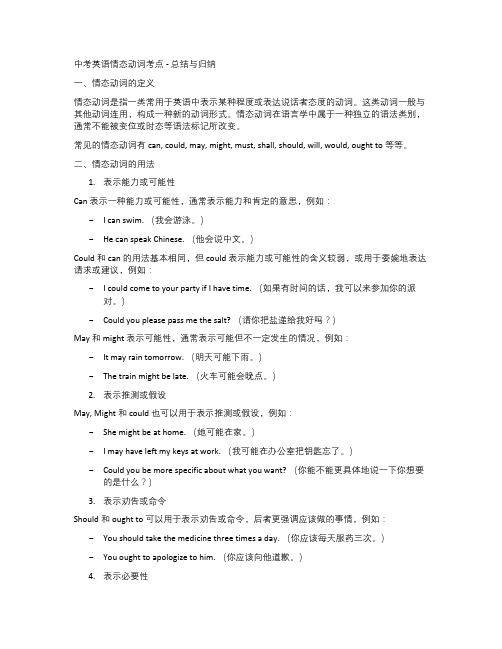
中考英语情态动词考点 - 总结与归纳一、情态动词的定义情态动词是指一类常用于英语中表示某种程度或表达说话者态度的动词。
这类动词一般与其他动词连用,构成一种新的动词形式。
情态动词在语言学中属于一种独立的语法类别,通常不能被变位或时态等语法标记所改变。
常见的情态动词有 can, could, may, might, must, shall, should, will, would, ought to 等等。
二、情态动词的用法1.表示能力或可能性Can 表示一种能力或可能性,通常表示能力和肯定的意思,例如:-I can swim. (我会游泳。
)-He can speak Chinese. (他会说中文。
)Could 和 can 的用法基本相同,但 could 表示能力或可能性的含义较弱,或用于委婉地表达请求或建议,例如:-I could come to your party if I have time. (如果有时间的话,我可以来参加你的派对。
)-Could you please pass me the salt? (请你把盐递给我好吗?)May 和 might 表示可能性,通常表示可能但不一定发生的情况,例如:-It may rain tomorrow. (明天可能下雨。
)-The train might be late. (火车可能会晚点。
)2.表示推测或假设May, Might 和 could 也可以用于表示推测或假设,例如:-She might be at home. (她可能在家。
)-I may have left my keys at work. (我可能在办公室把钥匙忘了。
)-Could you be more specific about what you want? (你能不能更具体地说一下你想要的是什么?)3.表示劝告或命令Should 和 ought to 可以用于表示劝告或命令,后者更强调应该做的事情,例如:-You should take the medicine three times a day. (你应该每天服药三次。
中考英语情态动词总结

中考英语情态动词总结情态动词是一类特殊的动词,表达了说话人的态度、意愿、能力、推测等情态。
常见的情态动词有can, could, may, might, must, shall, should, will, would, ought to等。
下面是关于这些情态动词的总结:1. can: 表示能力、许可。
常用于肯定句和疑问句中,一般不能用于否定句。
例如:"I can swim."(我会游泳。
)"Can you help me?"(你能帮我吗?)2. could: 表示过去的能力、许可,也可以用于请求或建议。
例如:"When I was young, I could run very fast."(我小时候跑得很快。
)"Could you please pass me the salt?"(你能帮我递一下盐吗?)4. might: 表示较小的可能性,常用于虚拟语气句中。
例如:"If it doesn't rain, we might go for a picnic."(如果不下雨,我们可能去野餐。
)5. must: 表示必须、推测的肯定。
例如:"You must finish your homework before you go out."(你必须在出去之前完成作业。
)"It's already 9 o'clock. He must be at home."(已经9点了,他一定在家。
)6. shall: 表示将来的意愿,用于第一人称(I, we)的疑问句中。
例如:"Shall we go to the park tomorrow?"(明天我们去公园吧?)7. should: 表示应该,常用于建议、请求中。
例如:"You should take a break."(你应该休息一下。
中考英语 情态动词would、will的用法归纳
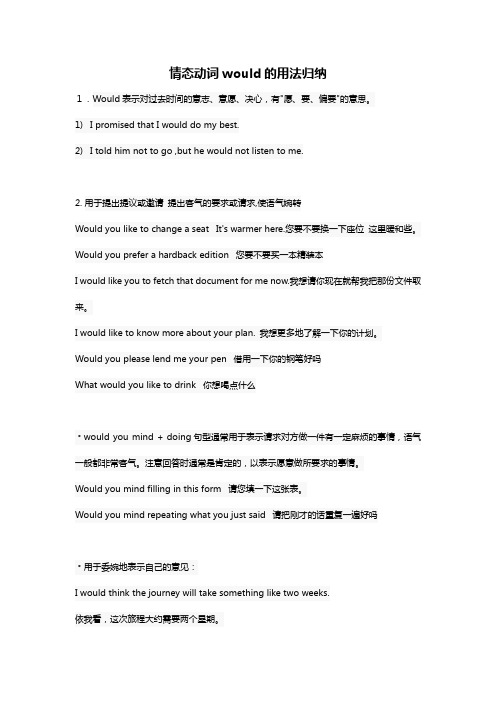
情态动词would的用法归纳1.Would表示对过去时间的意志、意愿、决心,有"愿、要、偏要"的意思。
1) I promised that I would do my best.2) I told him not to go ,but he would not listen to me.2.用于提出提议或邀请提出客气的要求或请求,使语气婉转Would you like to change a seat It's warmer here.您要不要换一下座位这里暖和些。
Would you prefer a hardback edition 您要不要买一本精装本I would like you to fetch that document for me now.我想请你现在就帮我把那份文件取来。
I would like to know more about your plan. 我想更多地了解一下你的计划。
Would you please lend me your pen 借用一下你的钢笔好吗What would you like to drink 你想喝点什么﹡would you mind + doing句型通常用于表示请求对方做一件有一定麻烦的事情,语气一般都非常客气。
注意回答时通常是肯定的,以表示愿意做所要求的事情。
Would you mind filling in this form 请您填一下这张表。
Would you mind repeating what you just said 请把刚才的话重复一遍好吗﹡用于委婉地表示自己的意见:I would think the journey will take something like two weeks.依我看,这次旅程大约需要两个星期。
I would look at the problem a little differently.我对这个问题的看法略有不同。
中考英语语法之情态动词与虚拟语气

中考英语语法之情态动词与虚拟语气情态动词(Modal Verbs)是英语语法中一个重要的部分,用于表达说话人对某种动作或状态的态度、观点或推测。
虚拟语气(Subjunctive Mood)则用于表达说话人对虚构、愿望、建议、命令等情况的假设、猜测或要求。
在中考英语考试中,掌握情态动词和虚拟语气的用法是非常关键的。
本文将具体介绍情态动词和虚拟语气的用法及注意事项。
一、情态动词的用法情态动词包括can, could, may, might, must, shall, should, will, would, ought to等。
它们在句子中通常和动词原形一起使用,用于表示能力、可能性、允许、推测等。
下面是一些常见的用法和例句:1. 表示能力和可能性- I can swim. (我会游泳。
)- She may come late. (她可能会来迟。
)- They could solve the problem. (他们可以解决这个问题。
)2. 表示允许和禁止- You may go now. (你现在可以走了。
)- Students must wear uniforms. (学生必须穿制服。
)- You should not smoke here. (你不应该在这里吸烟。
)3. 表示推测和猜测- He must be busy. (他一定很忙。
)- It might rain tomorrow. (明天可能会下雨。
)- She will probably pass the exam. (她可能会通过考试。
)二、虚拟语气的用法虚拟语气用于表达说话人对某种假设、愿望、建议、命令等情况的态度。
下面是一些虚拟语气的常见用法和例句:1. 表达假设和不可能实现的愿望- If I were a bird, I would fly in the sky. (如果我是一只鸟,我会在天空飞翔。
)- I wish I had a car. (我希望我有一辆车。
情态动词用法归纳总结

情态动词用法归纳总结情态动词是一类用来表示说话人的态度、观点和意愿的动词,具有一定的语法特点。
以下是情态动词的一些常见用法归纳总结:1.表示能力、可能性和推测:- Can: 表示能力和可能性,用于肯定句;例如:“I can swim.”(我会游泳。
)- Could: 表示能力和可能性,用于疑问句和否定句;例如:“Could you help me?”(你能帮助我吗?)- May/might: 表示可能性和推测;例如:“He may be busy.”(他可能很忙。
)- Must: 表示强烈的推测或肯定;例如:“He must be tired.”(他一定很累。
)2.表示许可和建议:- Can: 表示允许和禁止,用于肯定句;例如:“You can go now.”(你现在可以走了。
)- Could: 表示请求允许,用于疑问句和否定句;例如:“Could I borrow your pen?”(我可以借用你的笔吗?)- May/might: 表示请求允许;例如:“May I use your phone?”(我可以用一下你的手机吗?)- Should: 表示建议;例如:“You should eat more vegetables.”(你应该多吃蔬菜。
)3.表示义务和推测:- Must: 表示必须和义务;例如:“You must finish your homework.”(你必须完成作业。
)- Have to: 表示必须和义务;例如:“I have to go to work tomorrow.”(我明天必须去上班。
)4.表示可能性和意愿:- Can: 表示可能性和意愿,用于肯定句;例如:“I can help you with that.”(我可以帮你做那个。
)- Could: 表示可能性和意愿,用于疑问句和否定句;例如:“Could you please pass me the salt?”(请你把盐递给我好吗?)- May/might: 表示可能性和意愿;例如:“I may go to the party tonight.”(今晚我可能会去参加派对。
情态动词用法

情态动词是中考的重点考查项目,对学习情态动词的要求是:首先,了解情态动词各自的基本意义及用法。
然后,掌握情态动词表示推测的用法。
第三,注意带有情态动词的反意疑问句的用法。
情态动词的特征:1.本身有词义,但不完全。
因此不能独立作谓语,只能和动词原形一起构成谓语。
2.后接动词不定式一律不带to3.不随人称和数的变化而变化。
概说:情态动词表示说话人的语气和情态,需要,可能,愿意和怀疑等。
情态动词有一定的词义,但不完整,必须和主要动词的原形一起构成谓语。
常用的情态动词有:can, could, may, might, must, have to, ought to, need, dare, shall, will, should, would, be able to, etc.*saying you are able or unable to do things;can can’t*telling people what to do or what not to do;must mustn’t*asking for and giving permissionmay may notCAN:A.有或没有能力做某事We use can and cannot (can’t) to say we are able or not able to do things.Can you swim?你会游泳吗?I can rewrite it in English.我能用英语把它重新写一遍。
I can’t speak English.我不会说英语。
B. can既有“能,会”之意,也有“可能”之意(多用于否定句中表推测)。
He can’t be at home now, for I know that he has a meeting this afternoon.他现在不可能在家,因为我知道他今天下午有个会。
It can’t be true.那不可能是真的。
中考sure知识点总结
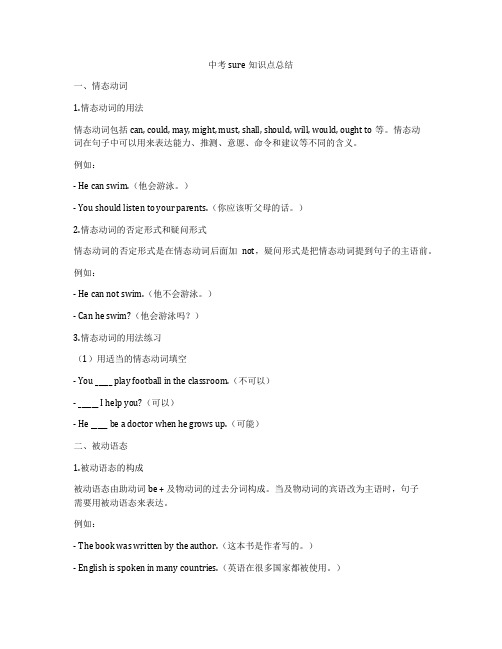
中考sure知识点总结一、情态动词1.情态动词的用法情态动词包括can, could, may, might, must, shall, should, will, would, ought to等。
情态动词在句子中可以用来表达能力、推测、意愿、命令和建议等不同的含义。
例如:- He can swim.(他会游泳。
)- You should listen to your parents.(你应该听父母的话。
)2.情态动词的否定形式和疑问形式情态动词的否定形式是在情态动词后面加not,疑问形式是把情态动词提到句子的主语前。
例如:- He can not swim.(他不会游泳。
)- Can he swim?(他会游泳吗?)3.情态动词的用法练习(1)用适当的情态动词填空- You _____ play football in the classroom.(不可以)- ______ I help you?(可以)- He _____ be a doctor when he grows up.(可能)二、被动语态1.被动语态的构成被动语态由助动词be + 及物动词的过去分词构成。
当及物动词的宾语改为主语时,句子需要用被动语态来表达。
例如:- The book was written by the author.(这本书是作者写的。
)- English is spoken in many countries.(英语在很多国家都被使用。
)2.被动语态的用法被动语态用于强调句子的动作发生者,或者在不知道或不重要知道动作是由谁来执行时。
例如:- The message will be sent by email.(这个消息将通过电子邮件发送。
)3.被动语态的用法练习(1)改写句子为被动语态- The students often water the flowers in the garden.- He will repair this bike next week.三、虚拟语气1.虚拟语气的构成虚拟语气用来表示假设、建议、愿望或对过去的虚拟推测。
初中英语中考情态动词与There be 的句子结构的归纳总结

初中英语中考情态动词与There be 的句子结构的归纳总结情态动词1.考查情态动词表示“推测”的用法[考点快忆] 表示肯定推测的情态动词有:must“一定;准是”,may“也许;可能”,might“或许”;表示否定推测的情态动词有:can't“不可能”,couldn't“不会”,may not“也许不”,might not“或许不”;can表示推测时不用于肯定句,may表示推测时不用于疑问句。
2.考查情态动词引起的一般疑问句的答语[考点快忆] 回答must时,肯定答语用must,否定答语用needn't或don't have to。
回答need时,肯定答语用must,否定答语用needn't。
回答may时,肯定答语用may,否定答语用mustn't 或can't。
3.考查情态动词的意义[考点快忆] must “必须”;have to“不得不”;need “必须;需要”;can(could)“能;可能”;may (might) “可以;可能”;shall,will (would)“将;会;愿意;要”;should“应当”。
“had better (not) + 动词原形”表示建议;have to / has to / had to的否定,疑问形式要借助于助动词do / does / did。
There be 的句子结构There be是一个“存在”句型,表示“有”的意思,肯定句的形式为:There be + 名词(单数或复数)+地点状语或时间状语。
be动词单复数的确定,看be后边第一个名词,当所接主语为单数或不可数名词时,be动词形式为is;当所接主语为复数名词时,be动词为are;当be动词后接两个以上主语时,be动词与最临近主语保持数上的一致。
意思为“某地有某人或某物”。
如:There is an eraser and two pens>There are two pens and an eraser (1)there be的否定句,即在be的后面加上not。
情态动词中考英语

中考英语语法之情态动词一.情态动词的用法1. can 用法1)表示能力,与be able to同义,但can只用于现在时和过去时,be able to 可用于各种时态。
Two eyes can see more than one.注:Can you … ? Yes, I can / No,I can’t.2).表示允许、请求用could比can 语气更加委婉客气,常用于could I /you …..?句型中,若表示同意时,用can回答而不用could .Could I borrow t he book ? No, you can’t .3)。
表示推测“可能”常用于否定句或疑问句中。
(can’t表示一定不是)It can’t be true . Can it be true ?2. may 用法1)表允许,请求= can表示许可或征求对方的许可,常于第一人称连用。
注:May I ….? Yes ,you mayNo, you can’t / mustn’t .在回答以may引起的问句时,多避免用这个词,而用其它方式,如Yes, please. / Certainly.2)表推测,可能、也许。
常用于肯定句中。
Maybe he knows the news .=He _maybe_ _knows_ the news.Maybe he is angry.= He _may_ _be_ angry.3. must1)表示义务。
意为“必须”(主观意志)。
We must do everything step by step.注:Must I ….? Yes, you must / No,you needn’t(don’t have to ).--Must we hand in our exercise—books now?--No, you needn’t. / No, you don’t have to.2)mustn’t 表禁止、不允许。
中考英语--情态动词should、had better和may的用法
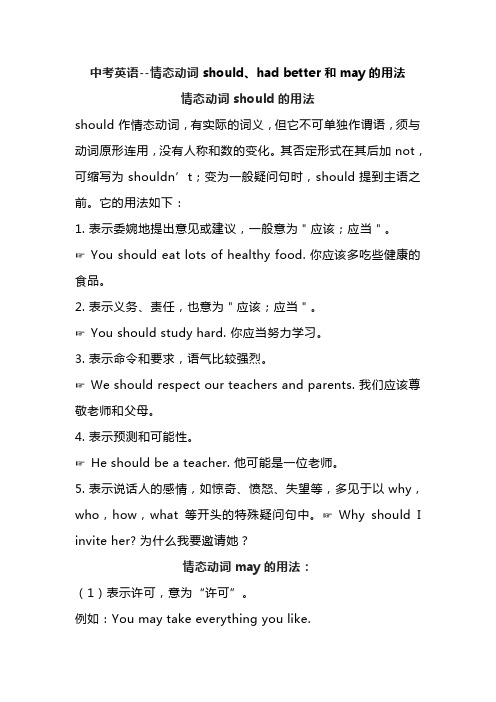
中考英语--情态动词should、had better和may的用法情态动词should的用法should 作情态动词,有实际的词义,但它不可单独作谓语,须与动词原形连用,没有人称和数的变化。
其否定形式在其后加not,可缩写为shouldn’t;变为一般疑问句时,should 提到主语之前。
它的用法如下:1. 表示委婉地提出意见或建议,一般意为"应该;应当"。
☞ You should eat lots of healthy food. 你应该多吃些健康的食品。
2. 表示义务、责任,也意为"应该;应当"。
☞ You should study hard. 你应当努力学习。
3. 表示命令和要求,语气比较强烈。
☞ We should respect our teachers and parents. 我们应该尊敬老师和父母。
4. 表示预测和可能性。
☞ He should be a teacher. 他可能是一位老师。
5. 表示说话人的感情,如惊奇、愤怒、失望等,多见于以why,who,how,what等开头的特殊疑问句中。
☞ Why should I invite her? 为什么我要邀请她?情态动词may的用法:(1)表示许可,意为“许可”。
例如:You may take everything you like.(2)表示推测,通常用于肯定句和否定句中,意为“可能”。
例如:He may be very busy now.注意:can和may都不是可能性,can通常用于否定句和疑问句中,而may通常用于肯定句和否定句中。
虽然两者均可用于否定句中,但其意思不同:can't意为“不可能”,may not意为“可能不”。
另外,can和may均可表示请求允许,但can为一般用词,而may为正式用词。
had better的用法其意为“最好”、“应该”,后接动词原形,与情态动词should 用法相似,其中的had通常缩略为 'd。
情态动词用法总结归纳
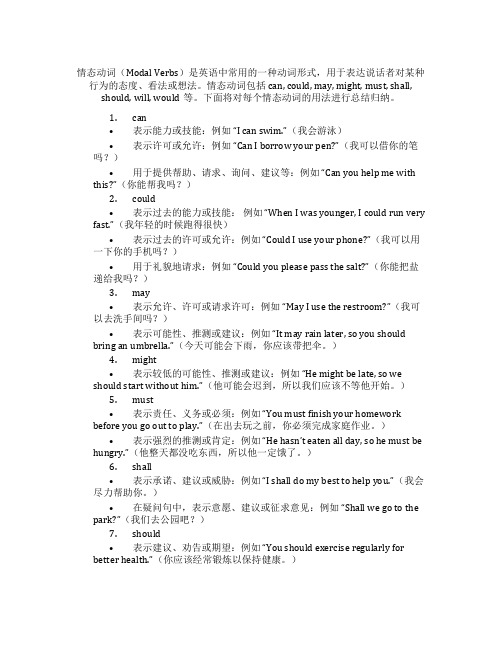
情态动词(Modal Verbs)是英语中常用的一种动词形式,用于表达说话者对某种行为的态度、看法或想法。
情态动词包括can, could, may, might, must, shall, should, will, would等。
下面将对每个情态动词的用法进行总结归纳。
1.can•表示能力或技能:例如“I can swim.”(我会游泳)•表示许可或允许:例如“Can I borrow your pen?”(我可以借你的笔吗?)•用于提供帮助、请求、询问、建议等:例如“Can you help me with this?”(你能帮我吗?)2.could•表示过去的能力或技能:例如“When I was younger, I could run very fast.”(我年轻的时候跑得很快)•表示过去的许可或允许:例如“Could I use your phone?”(我可以用一下你的手机吗?)•用于礼貌地请求:例如“Could you please pass the salt?”(你能把盐递给我吗?)3.may•表示允许、许可或请求许可:例如“May I use the restroom?”(我可以去洗手间吗?)•表示可能性、推测或建议:例如“It may rain later, so you should bring an umbrella.”(今天可能会下雨,你应该带把伞。
)4.might•表示较低的可能性、推测或建议:例如“He might be late, so we should start without him.”(他可能会迟到,所以我们应该不等他开始。
)5.must•表示责任、义务或必须:例如“You must finish your homewor k before you go out to play.”(在出去玩之前,你必须完成家庭作业。
)•表示强烈的推测或肯定:例如“He hasn’t eaten all day, so he must be hungry.”(他整天都没吃东西,所以他一定饿了。
初中英语中考情态动词考点及练习

情态动词【情态动词】又叫情态助动词.它们具有以下特色:⑴它们必须与其他动词连用,即:情态动词+动词本相暗示措辞人对所述动作的意见,如须要.可能.意愿或疑惑等.⑵绝大多半情态动词没有人称和数的变更,即第三人称单数不加-s(以be和have 开首的情态动词短语除外).⑶在意义上,情态动词具有“多义性”.例:can既可暗示才能,又可暗示可能.许可等意义.【情态动词的根本用法】1. can的根本用法:⑴暗示体力或智力上的才能,即“可以或许,会”,可与be able to转换.例:He can speak English. = He is able to speak English.—Can you play basketball?— No, I can’t.假如暗示未来具备的才能,要用will be able to.例:If I have a good sleep, I will be able to do the problem.⑵暗示许可,重要用于白话,书面语一般用may.例:—Can we go home now, please?— No, you can’t.You can only smoke in this room.You can’t keep the library books for more than a month.⑶暗示“可能”,与may同义,但一般用在疑问句中.例:What can he possibly want?在否认句中,否认情势can’t暗示推想“不大可能”.例:Anybody can make mistakes.The news can’t be true.与第一.二人称连用时,还可以就可能的解决问题的方法或可能的行动提出建议.在这里,也可用could 使语气悠扬.例:Can / Could we meet again next week? 下周我们可以再会晤吗?—What shall we do? 我们怎么办呢?— We can / could try asking Lucy for help. ——我们可以请露茜辅佐尝尝看.You can / could help me with the cooking. 你可以帮我做饭.2. may的根本用法:⑴暗示“许可”,用can比较白话化.例:You may / can come if you wish. 假如你想来,你就来.You may not pick flowers in this park. 本公园内不准摘花.(may not暗示按划定不准可,假如用mustn’t则暗示措辞人不准可.)我可以在这里抽烟吗?—.(mustn’t暗示明白的制止.)⑵确定句中暗示推想,“可能”.例:It may rain tomorrow. 明天可能会下雨.The news may not be true. 这个新闻可能不会是真的.留意:假如,通经常应用例:Can it be true? 那会是真的吗?Who can he be? 他毕竟是谁呢?⑶【留意】:……?—Yes, you —No3. must的根本用法:⑴暗示必须,强调措辞人的主不雅意志.例:I must go now, or I’ll be late.You must be here by ten o’clock.【留意】:暗示“必须“时,must的否认式为或而不是mustn’t.也就是:—Must I/we do it now?—Yes, you—No, you例:—Must I go with them?—No, you .⑵暗示推想,一般只用于确定陈述句,暗示异常确定.例:She didn’t look at me. She must be angry. 她不朝我看,必定是朝气了.He is good at English. He must know the word. 他英语好,准知道这个词.You must be Mr. Jones. 想必您就是琼斯师长教师吧.4. have to的根本用法:have to可视为情态动词,但它与其他情态动词在用法上稍有不合.其他情态动词没有人称和数的变更,而have to却有人称和数的变更,要视主语的不合而变更.例:I / You / We / They have to….He / She / It has to….You don’t have to….Does she have to…?意思是“必须,不克不及不”.和must不合之处:must强调主不雅须要have to强调客不雅须要.例:Sorry, I have to leave now. 对不起,如今我得走了.I’ve got to go to a meeting. 我得去介入一个会议.Will he have to work deep into the night? 他将不克不及不工作到深夜吗?5. need的根本用法:need的根本词义是“须要”,它既可作情态动词,又可作实义动词.⑴ need用作情态动词时,只用于否认句和疑问句.它只有一种情势,后接动词本相.例:I don’t believe you need worry. 我信任你没有须要着急.—Need we go so soon? 我们须要这么早就去吗?— Yes, we must. / No, we needn’t. 是的,必须./不,不必.So I needn’t tell him, need I? 所以我不须要告知他,对吧?请比较以下两句话的不合意思:You needn’t buy the coat. 你没有须要买那件外套.(你还没买)You needn’t have bought the coat. 你没有须要买这件外套的.(而你却买了)【留意】:……?—Yes,you —No, you⑵need,有时态.人称和数的变更.假如人作主语,一般后接带to的动词不定式.即假如物作主语,一般后用例如:I need to look up this word in the dictionary.My watch needs mending/to be mended. 我的手表须要补缀了.We don’t need to work today. (= We needn’t work today.)Does he need to go right now? (= Need he go right now?)6. had better的根本用法:had bette r常略作’d better.现代语法以为它是一个助动词,因为它后接不带to的动词不定式.意思是“最好做某事;照样做某事比较好”.例:You’d better get some sleep. 你最好睡一会儿.You’d better not do that again. 你最好别再做那件事.What had we better do now? 我们如今怎么做才好呢?Hadn’t we better tell her the truth? 我们是否最好不告知她本相?7. could, should, would, might暗示推想:①.must多用于确定句中暗示掌控性极大的推想,意思为“必定.确定”.如: You have worked hard all day. You must be tired. 你已辛劳工作一成天了,必定累了.The book must be his. His name is on the cover. 这本书必定是他的,封面上写着他的名字.【留意】 must不表推想时,在确定句中意思为“必须(强调内涵的职责)”,在否认句中意思为“不准.制止”,以它开首的疑问句否认答复经常应用needn’t或don’t (doesn’t) have to.如:We must obey the traffic rules. 我们必须遵照交通规矩.Cars mustn’t be parked here. 此处严禁泊车.—Must we hand in the papers this week? 我们必须本礼拜交论文吗?—No, you needn’t. 不,你们不必(本礼拜交).②. can / could多用于否认句.疑问句或感慨句中暗示推想.疑惑,两者在时光上没有不同.用can时不信任的程度更强一些,如:The man under the tree can’t be Tom. He’s gone to England.这小我不成能是Tom,他已经去英国了.Can it be true that he was fooled by a five-year-old boy? 他被一个五岁的孩子愚弄了,这能是真的吗?Could this be an excuse? 这会不会是个托言?How can you be so careless! 你怎么如许粗心!③.may / might多用来暗示掌控性不大的推想,意思为“也许.可能”, might比may的掌控性更小一些.留意区分“不成能”与“可能不”在掌控性大小上的差别.) 如:Mr. Wang may know Professor Li’s telephone number.王师长教师也许知道李传授的德律风号码.This might be the key Tom has been looking for.这可能就是汤姆一向在找的钥匙.She may not be there today. 今天她可能不在那儿.一、典范例题【中考链接】()1.—Who is the man over there? Is it Mr. Li?— No, it ______ be him. Mr. Li is much taller.A. mustn’tB. may noC. can’tD. needn’t()2.—Must I go with them tomorrow?— No,you ______.A. mustn'tB. shouldn'tC. needn'tD. can't()3.—______ I take some photos in the hall?— No, you ______.A. Can, needn’tB. Must, mustn’tC. Could, won’tD. May, mustn’t()4.—Dad, must I finish my homework today?—No, you ________. You may do it tomorrow.A. needn’tB. mustn’tC. don’tD. won’t()5.—The lake is said to be dry. Is that true?—It _______.Look, some kids are swimming in it.A. must be trueB. can’t be trueC. may not be true()6.—What is your mother going to do this Saturday?—I’m not sure. She _____ go to see my grandmother.A. canB. mustC. may()7.—Susan has bought a large house with a swimming pool.—It ______ be very expensive. I never even dream about it.A. mustB. mightC. can’tD. shouldn’t()8.—Listen! Is Professor Johnson giving a report in the hall?—No, it be him. He has gone to Japan.A. needn’tB. may notC. mustn’tD. can’t()9.—Let’s go to the West Hill Park by taxi.—Oh, it is not far away from here. We _______take a taxi.A. couldn’tB. mustn’tC. needn’tD. can’t()10.—Can you play the piano?—Yes, I _______. I often practice it on weekends.A. needn’tB. needC. can’tD. can三.课后演习一.用can, may, must, need, have to, had better的恰当情势填空:1.You ________________ return the library book on time.2.I ______________ (not) find the way to the hospital. _______________ you show me the way?3.—________________ I finish the work right now?— No, you ________________ (not). You ____________ do it later.4.He said he ________________ (not) come tonight.5.Her mother was ill. She ________________ stay at home and look after her.6.It’s time for class. You ________________ stop playing football or you __________be late for class.7.We ________________ start right now, or they would get there first.8.The cloud is lifting, so it ________________ (not) be a rainy day tomorrow.二.选择填空()1.—Do we have to finish our homework this afternoon?—Yes, you ________.A. mustB. canC. mayD. need()2. —Must I be in hospital for a week, Doctor?—No, you . You can go back home tomorrow.A.mustn’tB. needn’tC. must()3. The desk is not dirty. You _______clean it.A. mustn’tB. shouldn’tC. needn’t C. can’t()4. —May I watch TV for a while?—No, you _______. You have to finish your homework first.A. shouldn’tB. needn’tC. mustn’tD. won’t()5.—Is Jessica giving us a speech this evening?—No, it ________be her. She________ to Japan.A. mustn’t; has goneB. mustn’t ;has beenC. can’t ;has goneD. can’t ;has been()6. It’s the library! So you________ know shouting is not allowed here.A. canB. mustC. needD. may()7. Boys and girls, don’t forget your report . It ______ today.A. can’t finishB. can’t be finishedC. should finishD. should be finished()8.—Mr Smith must have been to your home this morning.—No, he ______ ,because he didn’t know my address.A. couldn’tB. can’tC. mustn’tD. may not ()9. —Must I mop up the window now?—No, you________.A.needn’tB. can’tC. shouldn’tD. mustn’t()10. —Is Lucy knocking at the door?—No. It ________ be Lucy. She is in Japan now.A. needn’tB. mustC. can’t()11. —Another cup of coffee?—No, thanks. I _____ be off. Mary is waiting for me.A. canB. mayC. mustD. might()12. —I’m a little tired. Let’s go to the zoo by taxi.—We take a taxi. It’s not far from here.A. can’tB. mustn’tC. couldn’tD. needn’t()13. If the traffic light is red, you ________ cross the road. It’s very dangerous.A. don’tB. mustn’tC. needn’tD. wouldn’t()14. —Must I finish watering the flowers now?—No, you________.A. mustB. won’tC. needn’tD. can’t()15. —I can’t give up smoking, doctor.—For your health, I’m afraid you ________.A. mayB. canC. have toD. must。
中考英语必考的十个情态动词
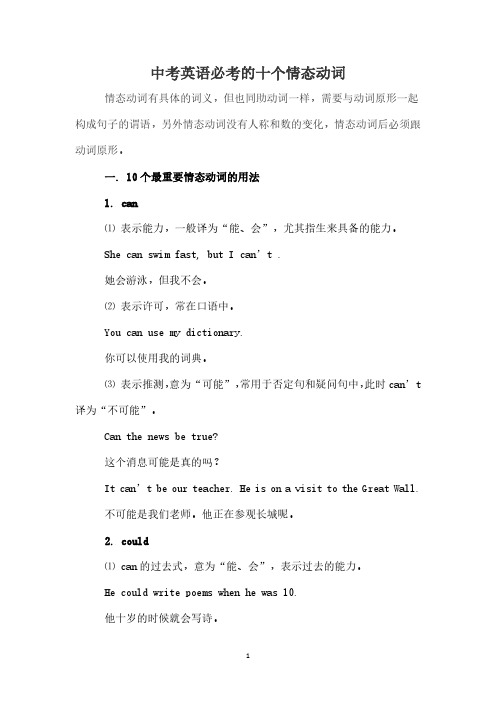
中考英语必考的十个情态动词情态动词有具体的词义,但也同助动词一样,需要与动词原形一起构成句子的谓语,另外情态动词没有人称和数的变化,情态动词后必须跟动词原形。
一. 10个最重要情态动词的用法1. can⑴ 表示能力,一般译为“能、会”,尤其指生来具备的能力。
She can swim fast, but I can’t .她会游泳,但我不会。
⑵ 表示许可,常在口语中。
You can use my dictionary.你可以使用我的词典。
⑶ 表示推测,意为“可能”,常用于否定句和疑问句中,此时can’t 译为“不可能”。
Can the news be true?这个消息可能是真的吗?It can’t be our teacher. He is on a visit to the Great Wall.不可能是我们老师。
他正在参观长城呢。
2. could⑴ can的过去式,意为“能、会”,表示过去的能力。
He could write poems when he was 10.他十岁的时候就会写诗。
⑵ could在疑问句中,表示委婉请求的语气,此时could没有过去式的意思。
Could you do me a favour?你可以帮我一个忙吗?—Could I use your pen? 我可以使用你的钢笔吗?—Yes, you can.(注意回答)可以。
3. may⑴ 表示请求、许可,比can正式,May I borrow your bike?我可以借用你的自行车吗?You may go home now.你现在可以回家了。
⑵ 表示推测,谈论可能性,意为“可能,或许”,一般用于肯定句中。
It may rain tomorrow .明天可能会下雨。
⑶ may的过去式为 might。
might 也可以表示可能性低于may(此时might没有过去式的意思)。
He is away from school. He might be sick.他离开学校了。
中考英语-情态动词

情态动词一.分类(一)can与could(过去式)1)表能力(体力,知识,技能)Can you lift this heavy stone?注意1:can在特定的场合能用be able to替换。
当表示经过努力才可以做成功的事时用be able to.He was able to go to the party yesterday evening in spite of theheavy rain.注意2:can只有一般现在时和一般过去时,而be able to则有更多时态I`ll be able to come this afternoon.2)表允许和请求。
Can I go now?Yes,you can./No,you can`t.此时可与may互换。
在疑问句中还可以用could,might代替,不是过去式,只是语气更委婉,不能用于肯定句和答语中。
Could I see you tomorrow?Yes, you can.3)表示客观可能性(客观原因形成的能力)This hall can hold 500 people at least.4)表示推测(惊讶,怀疑,不相信),常用于疑问句.否定句.和感叹句中。
Can this be true?This can be done by him.How can this be true?(二)may与might1)表示请求和允许。
might比may的语气更委婉,而不是过去式。
否定回答时可用can`t或者musn`t,表示不可以或禁止。
Might/ May I smoke here?No, you musn`t.Might/May I take this book out of this room?Yes,you can.(No,you can`t/musn`t)注意:用May I....?征求别人许可时比较正式和客气,而Can I...?更多用于口语。
- 1、下载文档前请自行甄别文档内容的完整性,平台不提供额外的编辑、内容补充、找答案等附加服务。
- 2、"仅部分预览"的文档,不可在线预览部分如存在完整性等问题,可反馈申请退款(可完整预览的文档不适用该条件!)。
- 3、如文档侵犯您的权益,请联系客服反馈,我们会尽快为您处理(人工客服工作时间:9:00-18:30)。
情态动词(一)情态动词概说1.情态动词也是“辅助性”动词,用来表示说话人的语气或情态。
情态动词所表示的情态有:请求、命令、允诺、可能、需要、敢于、愿望、义务、能力等。
2.情态动词本身有词义,但不能单独用作谓语,必须与动词一起构成谓语。
没有人称和数的变化。
如:3.有些情态动词的过去时与其原形相同,有些与原形不同。
(1) 与原形相同的有:must --- must(2) 与原形不同的有:can --- could will --- wouldmay --- might shall --- shouldneed --- needed have to --- had to(二)情态动词的种类:(见下表)情态动词的否定式为:情态动词+not(三)常用情态动词的用法:1.can与could(1)表示体力或脑力方面的“能力”,也能表示根据客观条件能做某事的“能力”。
当表示将来的能力时,一般用will be able to;当表示过去的能力时,一般用could。
Can you jump as far as he didI can’t catch up with Jim.I couldn’t speak well until I was five years.can与be able to二者都表示“能够”,区别是:can只有现在时和过去式,而be able to 可用于各种时态。
如:I’ll be able to speak French in half a year.He hasn’t been able to finish it on time.(2)表示允许。
①could比can更委婉,表示客气地请求或委婉地陈述意见,这种用法多用于陈述句和疑问句中。
You can go now.Could you go skating with me tomorrowI’m afraid I couldn’t give you an answer tonight.②当表示允许别人做某事时,用can而不用could。
——Could I use your phone for a while——Yes, of course you can.(3)表示可能性。
①理论上的可能性It can’t be true.Driving on these snowy roads can be very dangerous.②用于疑问句及否定句中,表示猜测或怀疑。
这时can 与could没有时间上的差异,只是could更委婉、客气。
How can that be true I can’t believe my eyes and ears.He couldn’t be in Beijing.③can/could have done 表示对过去发生的事情的推测。
can have done主要用于疑问句和否定句中。
Mary can’t have gone to school, for it is Sunday today.She could have told Jim yesterday about the delay of the party.2.may与might(1)表示请求、许可。
①may 和might表示许可时,比can和could更正式。
might含有试探和犹豫不决的意思。
Might表示委婉地请求。
—May/Might I use your dictionary—Yes, please/certainly.Might I ask you a questionWe didn’t know that he might be our new teacher.②may not用来表示拒绝或禁止,而might没有该用法。
Students may not stay out after midnight.(2)表示可能性、推测might不是may的过去式,表示可能性比may表示的可能性要小。
May不用于提问是否可能的疑问句。
I may leave for Hangzhou next week.I’m afraid it might snow tomorrow.(可能性小)★在表示可能性时,may not意为“可能不”,can’t意为“不可能”He may come or may not come. I’m not too sure. 他可能来,也可能不来。
我不确定。
He can’t believe you. 他不可能相信你。
(3)may用于感叹句中可以表示祝愿或愿望。
May you do well!May you have a good time!3.must和have to(1)表示义务①两者都表示义务。
must表示依谈话人或听话人而定的义务,即主观的;have to表示来自外界的义务,即客观的。
Soldiers must obey orders.The children have to get up early to catch the first bus, because the school is too far.②must仅表示现在或将来的义务,过去的义务用had to。
The boy got very emotional when I had to leave, and started to cry.③mustn’t表示“禁止,不允许”;don’t/doesn’t have to表示“不必”。
All these books mustn’t be moved.You don’t have to/ needn’t/ don’t need to tell him the truth if you don’t want to.(2)must表示可能性①must在肯定句中表示肯定的推测:一定。
在否定句或疑问句中,要用can’t和can。
He must be our new teacher.He can’t be our new teacher.What do you think this letter can mean②表示对现在的猜测用must,表示对过去发生事情的猜测用must have done。
在否定句或疑问句中,要用can’t/can have done。
He must be at home.(对现在的猜测)I think you must have made a mistake.(对过去的猜测)I think you can’t have made a mistake.(3)must表示偏要、偏偏在疑问句中,must可以用来表示一个人较强烈的感情。
Why must it rain on Sunday 为什么偏要在星期天下雨呢4.will与would(1)表示意愿、决心。
此时可用于各种人称。
would表示过去式He won’t come to see you.他不愿来见你。
(表示意愿)I will try my best to catch up with her.我将尽最大努力赶上她。
(表示决心)He said he would do everything for her, but she said she would never see him again. (表示过去的决心)(2)表示请求,此时仅限于“will you (please)…”句型中,仅用于第二人称和疑问句中。
would比will语气更委婉。
Will you please buy me an English-Chinese dictionary when you go to the bookstoreWill you have some riceWould you open the door(3) will和would用于“劝某人接受……”时,只能用some,不能用any。
如:Would you like some fish 吃点鱼好吗5.shall与should(1) shall的用法①用于第一、三人称的疑问句中,表示说话人征求对方的意见或请求。
表示“要不要……”、“……好吗”Shall we/I put off the sports meet until next month 我/我们能将运动会推迟到下个月吗Shall he go there with me tomorrow 他明天可以和我一起去吗②用于第二、三人称,表示说话人给对方的许诺、命令、警告等。
You shall get an answer from me by tomorrow. 许诺You shall be punished for what you’ve done. 警告③用于第三人称,在条约、规定、法令等文件中表示“应该、必须”。
The National Party Congress shall be held every five years. 党的全国代表大会每五年举行一次。
(2)should的用法①“应该”,表示劝告或建议(=ought to)You should wash your hands before dinner. 你应该在饭前洗手。
We should help each other.②用来表示可能性或猜测,译为“应该、按道理说应该”He should be in the office now.I should be right.③表示说话人的情感等,如惊奇、愤怒、失望。
It’s funny that they should be confident.(表示轻视)Why should I do that for you(表示不满)④should have done表示某件事本应该完成却未完成;shouldn’t have done则表示某事不该发生却发生了。
You should have told us the truth.(应该告诉却没有)He should have known the importance of it.应该知道却不知道)We shouldn’t have left so early.(不应该早出来,可已经做了)6.need(1)need作情态动词①need意思是“需要,必须”,主要用于否定句和条件句中。
You needn’t come so early.I’ll lend Peter the money if he need use it right now.②need引导的疑问句,肯定回答时多用must,否定回答时用needn’t。
Need he comeYes, he must.No, he needn’t.(2) need作实义动词①need后接名词做宾语时,表示“需要”某件事物,此时用作实义动词,与一般的实义动词用法完全一样,有人称和数的变化。
